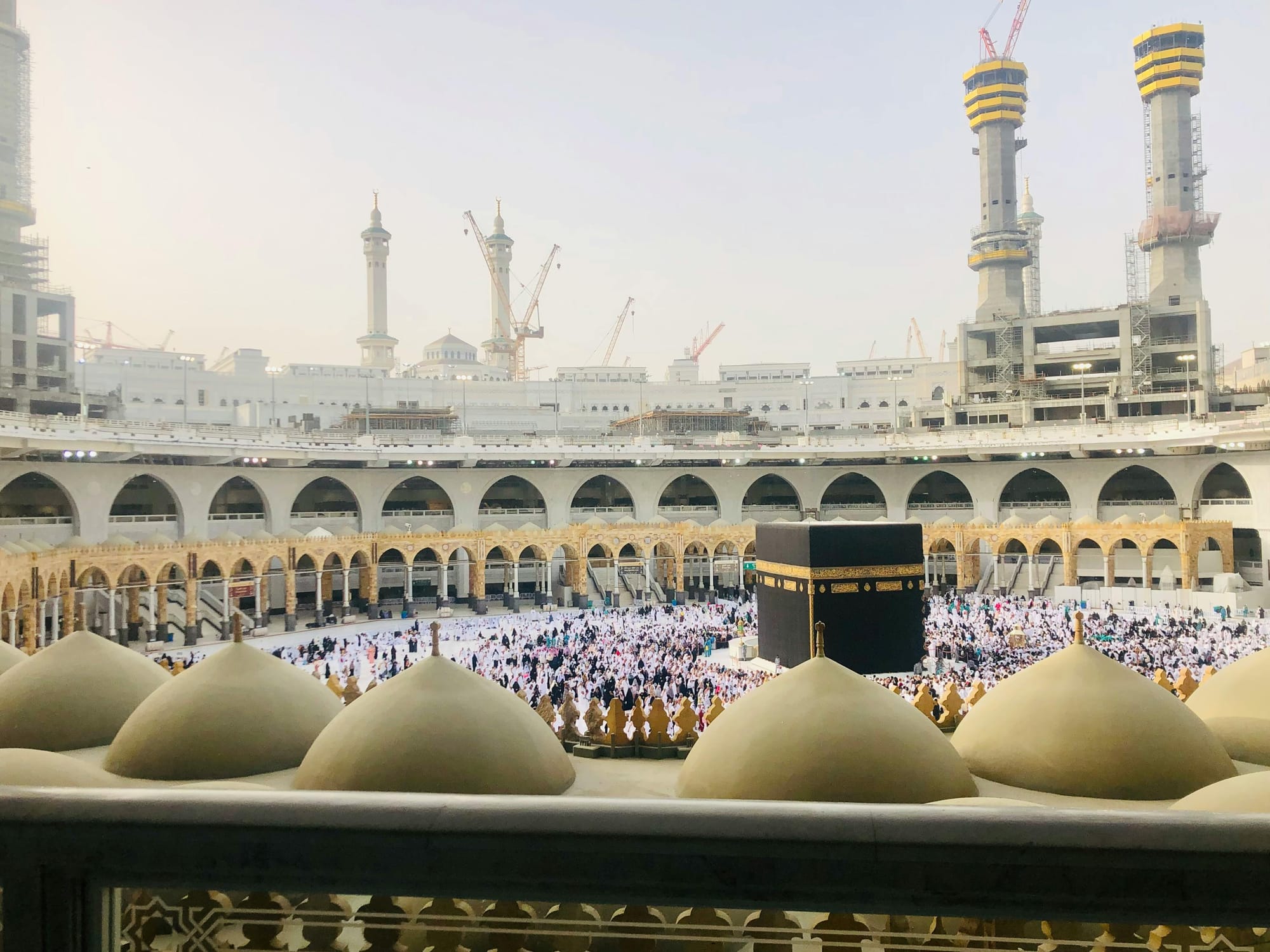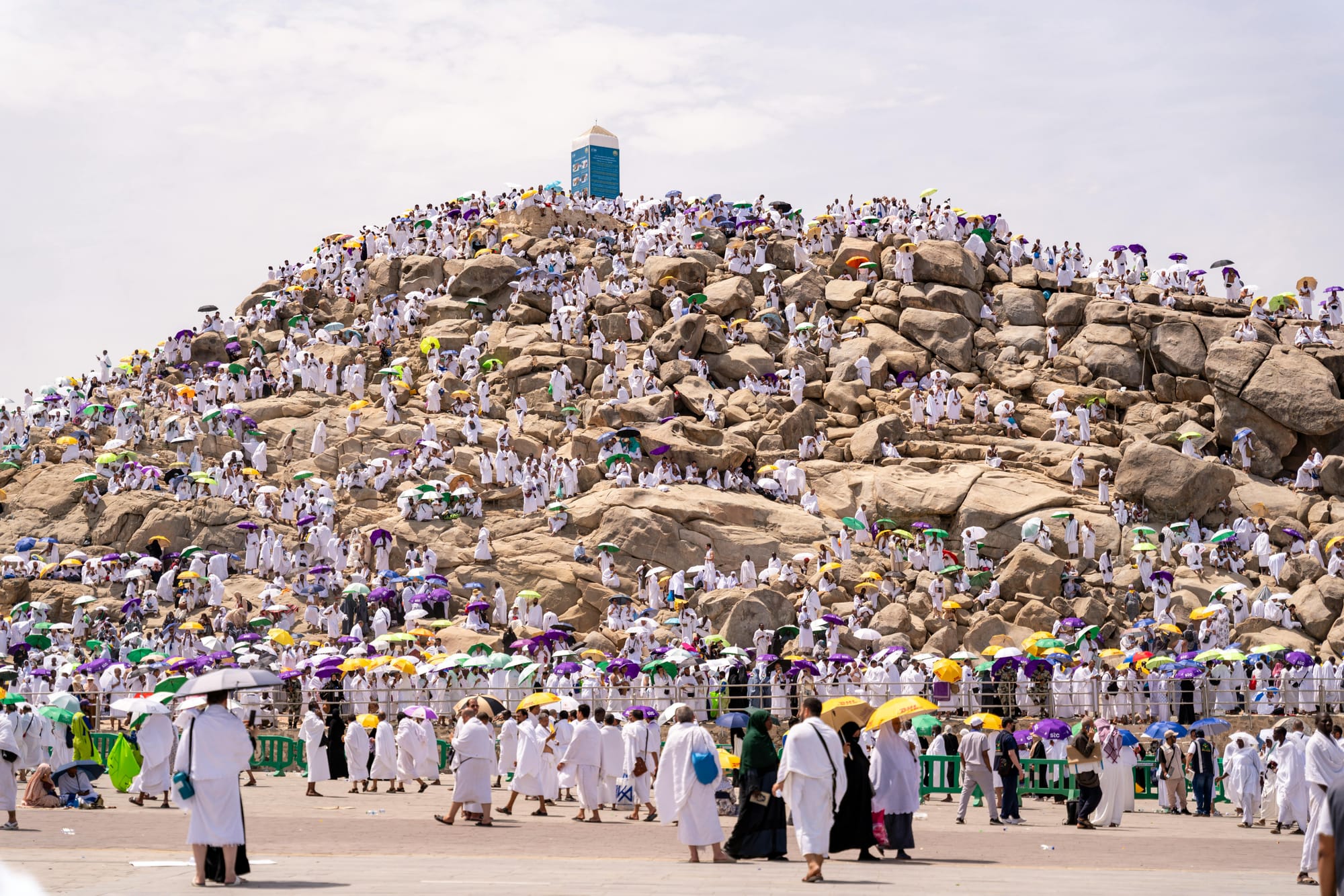If you're planning to go on Hajj this year - or you're simply curious about what it involves - you’re in the right place. Hajj is more than just a journey; it's a deeply personal and transformative spiritual experience that millions of Muslims long for. Whether it’s your first time or you're going again with family, this guide is here to walk you through everything, in a way that’s easy to follow and genuinely helpful.
Let’s make this the year you feel informed, spiritually prepared, and deeply connected to the journey.
What Is Hajj and Why Is It Important?
What does Hajj mean in Islam?
Hajj is the sacred pilgrimage to the holy city of Mecca, and it's one of the Five Pillars of Islam - a foundational act of worship that shapes a Muslim’s spiritual life. But Hajj is so much more than a religious obligation. It's a journey of the heart, a physical and emotional quest to seek closeness to Allah, and a rare opportunity to stand shoulder to shoulder with Muslims from every corner of the world, united by the same faith, hope, and longing for forgiveness.
Every step of Hajj - from donning the white garments of Ihram to standing on the plain of Arafat - is filled with deep spiritual symbolism. It’s a chance to let go of distractions, humble yourself before your Creator, and remember that in the eyes of Allah, we are all equal - regardless of wealth, background, or status.
Hajj is not just a trip. It’s a once-in-a-lifetime opportunity to return home with a heart renewed, a soul cleansed, and a deeper connection to your purpose as a Muslim.
Is Hajj mandatory for every Muslim?
Yes - but with compassion and balance. Hajj is only required once in a lifetime, and only for those who are physically, mentally, and financially able to perform it. That means if you're struggling with health, facing financial hardship, or unable to travel safely, you're not held accountable. Islam is a religion of ease, and Allah does not burden a soul beyond what it can bear.
So while Hajj is a pillar of faith, it’s not a race or a competition. It’s a personal invitation from Allah - and when your time comes, you'll know.

Spiritual and historical significance
Hajj isn’t just a series of rituals - it’s a profound journey through sacred history. Every step you take echoes the footsteps of some of the most beloved figures in Islam: Prophet Ibrahim (AS), his devoted wife Hajar, and our beloved Prophet Muhammad ﷺ. These aren’t distant stories; they’re living legacies that come to life as you retrace them with your own feet.
When you run between the hills of Safa and Marwah, you're stepping into the strength and desperation of Hajar as she searched for water for her son. When you stand in silent reflection at Arafat, you stand where the Prophet ﷺ gave his Farewell Sermon - a moment that still ripples through time. When you circle the Kaaba, you're joining generations of believers in glorifying Allah at the heart of the Muslim world.
Each ritual is loaded with meaning. It’s a test of patience, humility, faith, and surrender. Hajj strips away the noise of life and brings you face to face with your Creator. It’s a journey that transforms you not just on the outside, but deep within your heart, one that can change the way you walk through the world long after you return home.
When Is Hajj in 2025?
Dates for Hajj 2025 (Dhul Hijjah 1446 AH)
Hajj in 2025 is expected to begin on the evening of Thursday, June 5 and run until Tuesday, June 10, aligning with the 8th to 13th of Dhul Hijjah, 1446 AH. Remember that the exact dates depend on moon sightings.
How long does Hajj last?
The main rituals take about five to six days, but most pilgrims spend around two weeks in Saudi Arabia to get acclimated and fulfil all their travel and worship needs.

Who Can Go to Hajj?
Who is exempt from Hajj?
Hajj is a pillar of Islam but one that comes with mercy and understanding. It’s not required for children, those with serious health conditions, or anyone who truly can’t afford the journey. Allah is All-Knowing and Just, and He never burdens a soul beyond what it can handle.
Can a woman go to Hajj alone?
In most cases, women under the age of 45 are expected to travel with a mahram (a male guardian). However, in recent years, some Hajj authorities have introduced special group travel options for women, allowing them to go as part of supervised, female-only groups with official oversight.
Every woman’s situation is unique, so if you're considering Hajj without a mahram, it’s a good idea to speak with a trusted local imam or scholar who can advise based on your circumstances. The key is ensuring your journey is safe, supported, and in line with Islamic guidance.

Can non-Muslims visit Mecca?
No, Mecca is a sacred sanctuary reserved for Muslims. It’s not a tourist destination - it’s a place of deep worship, reflection, and connection with Allah. This exclusivity isn’t about exclusion, it’s about reverence. The city is protected to preserve its spiritual atmosphere for those making the sacred journey of Hajj or Umrah.

How to Perform Hajj: A Step-by-Step Guide
The 7 stages of Hajj explained
Hajj can feel overwhelming at first glance, especially with so many rituals involved - but once you understand the flow, it becomes a beautiful and rhythmic act of worship. Think of it as a sacred story that unfolds step by step, with you at the heart of it.
Here’s a simple breakdown of the core stages:
- Ihram: This is where your journey begins. You enter a sacred state of worship, wearing the special white garments (two unstitched cloths for men; modest, simple dress for women). It’s a physical and spiritual reset - a declaration that you’re leaving behind the world’s distractions to focus purely on Allah.
- Tawaf: You circle the Kaaba seven times counterclockwise, pouring your heart out in remembrance, gratitude, and supplication. It's a deeply emotional moment for many.
- Sa’i: You walk between the hills of Safa and Marwah, retracing the powerful footsteps of Hajar (AS) as she searched desperately for water. It’s a symbol of perseverance, trust, and maternal courage.
- Arafat: The Day of Arafat is the pinnacle of Hajj. You stand in prayer and reflection from noon until sunset, begging Allah for forgiveness and mercy. Many say this is the most spiritually intense day of their lives.
- Muzdalifah: After Arafat, you travel to Muzdalifah to gather pebbles and spend the night under the open sky. It’s simple, quiet, and grounding - a moment to connect with creation and reflect on everything you’ve just experienced.
- Ramy al-Jamarat: You throw those collected pebbles at three pillars symbolizing Shaytan, rejecting his whispers and reaffirming your commitment to obeying Allah.
- Tawaf al-Ifadah: This is a final, powerful circling of the Kaaba, marking the completion of your main rites and your return to a purified state.
Each act is filled with meaning and designed to pull your heart closer to your Creator. Whether it’s the physical hardship or the spiritual awakening, every step is part of the transformation.

What is Ihram and how do you wear it?
Ihram is more than just clothing - it’s a sacred state of intention. For men, it means two unstitched white cloths that cover the body; for women, it’s any modest dress that adheres to Islamic guidelines. But the essence of Ihram lies in the mindset: humility, unity, and a deep awareness that you’re stepping into a once-in-a-lifetime conversation with your Lord.
In this state, you're reminded that no title, status, or wealth matters. Every pilgrim stands equal before Allah, wrapped in simplicity and sincerity.
💡 During Hajj, you’ll be engaging in acts of worship that include Quran recitation - whether during quiet moments of dhikr or while performing rituals like Tawaf. If you’re trying to review or strengthen your recitation beforehand, Tarteel lets you recite directly into your phone while receiving instant feedback on your accuracy. It’s like having a teacher in your pocket - even when traveling.
Essential Rules and Prohibitions During Hajj
What is not allowed during Hajj?
When you enter the sacred state of Ihram, certain actions are prohibited as part of your spiritual discipline. These include:
- Cutting your nails or hair
- Wearing perfumes or scented products
- Engaging in arguments or losing your temper
- Marital intimacy
- Killing or harming animals - even insects
These restrictions aren't meant to be burdensome. Instead, they help you detach from worldly concerns and remain focused on your worship, reflection, and submission to Allah.

Can you sleep with your spouse during Hajj?
Not while in the state of Ihram. Intimacy becomes permissible again only after you’ve completed specific rites and exited Ihram. Until then, maintaining spiritual focus and modesty is part of the journey.
What happens if you make a mistake?
Slip-ups can happen - especially during a physically demanding and emotionally intense experience like Hajj. Most mistakes have expiations (like fasting or sacrificing a small animal), but don’t worry: Allah is merciful, and your intention matters more than perfection. Stay sincere, stay humble, and keep going.
What to Pack for Hajj
Practical checklist
- Ihram garments (plus an extra set!)
- Comfortable, slip-on sandals
- Unscented toiletries
- Travel prayer mat
- Lightweight backpack
- Water bottle or hydration pack
- Small snacks (dates, energy bars, etc.)
- Quran or dua journal
- Portable charger
- The Tarteel app
Dress code for women and men
- Men: Two unstitched white cloths that represent purity, equality, and humility.
- Women: Any modest Islamic attire - typically loose, breathable clothing with a hijab. There’s no requirement to wear white or specific styles.
How Much Does Hajj Cost in 2025?
Hajj packages from different countries
Costs vary depending on where you're traveling from, how long you're staying, and the type of package you choose:
- USA: $8,000–$15,000
- UK: £6,000–£11,000
- South Asia: Often more budget-friendly due to proximity and government quotas
Budgeting tips for first-timers
- Book early to secure lower prices
- Compare group vs. private packages
- Choose essential services over luxury if you're on a budget
- Budget for extras: meals, gifts, SIM cards, and transportation
Common Questions About Hajj
Why is Hajj so expensive?
Hajj involves large-scale logistics, accommodations, transport, and safety coordination for millions of people. While the costs can be high, remember—this is not a holiday. It's a sacred journey, and the reward for it is priceless.
What’s the difference between Hajj and Umrah?
Umrah is a smaller pilgrimage that can be performed any time of year and involves fewer rituals. Hajj is only performed in Dhul Hijjah and is required once in a lifetime for eligible Muslims.
What's inside the Kaaba?
Inside the Kaaba is a simple, serene space. There are no treasures - only a few pillars, inscriptions, and the fragrance of centuries of worship. The true significance of the Kaaba lies not in what’s inside, but in what it represents: the spiritual heart of the Muslim world.

Hajj Tips for a Spiritually Transformative Journey
How to prepare spiritually and emotionally
- Begin your preparation months in advance
- Start making dua lists now
- Read about the stories behind the rituals
- Memorize key surahs or duas using the Tarteel app for practice
Making the most of your dua
- Be specific, heartfelt, and sincere
- Ask for both dunya and akhirah
- Reflect on your life, your habits, your hopes
- Write your duas in a journal
Staying patient and focused
It will be crowded. It will be hot. Your body will feel it - but so will your heart. Hajj is not meant to be easy. It’s meant to be transformational. Every delay, every discomfort - view it as part of your purification. Breathe, smile, and remember Who you’re here for.
What Happens After Hajj?
Does Hajj erase all sins?
Yes, if performed sincerely, Hajj wipes your past sins clean. You return like a newborn, with a blank slate and a heart full of possibility.
Returning home: What changes?
You may notice your priorities shift. What once felt important might fade in significance. Your daily habits might become more mindful. You’ll feel it - and so will the people around you. Let Hajj be a turning point, not just a memory.
How to maintain spiritual momentum
- Set new goals for Quran memorization or reading
- Join a study circle or community group
- Continue listening to Quran daily
- Use the Tarteel app to keep your connection strong—it can guide you, track your goals, and even gently correct your recitation as you grow

Hajj Resources
Whether you're preparing for your first Hajj or returning for another spiritual experience, these tools and resources can help you feel more informed, organised, and connected throughout your journey:
🕋 Official & Informational Sites
- Saudi Ministry of Hajj and Umrah – Official updates, requirements, and visa info.
- Yaqeen Institute – Hajj Series – High-quality videos on the significance of Hajj, hosted by Sh. Abdullah Oduro.
- Productive Muslim – Hajj Planning – Productivity tips and spiritual prep for Hajj.
📖 Quran & Islamic Learning
- Tarteel App – AI-powered Quran app for memorization, recitation, and real-time mistake detection.
- Quran.com – Free access to the Quran in multiple languages, reciters, and tafsir.
- SeekersGuidance – Reliable Islamic education on Hajj fiqh and spiritual guidance.
- Darussalam Publications - Books and resources on all things Hajj.
🧳 Hajj Travel & Packing Tools
- Hajj Safe – Anti-theft bags, unscented products, and health accessories made for pilgrims.
- Zamzam Academy Hajj Guide – Practical and spiritual guides with downloadable checklists.
📝 Journaling & Reflection
- The Dua Journal – Beautiful, guided Islamic journals for reflection and dua-writing.
- The Muslim Journal Company – A modern, faith-centred journal company to track your Hajj, Umrah, Salah and more!
- Life with Allah - eBooks on Hajj and Dhul Hijjah overall.
- Tarteel’s Quran Goals Feature – Set post-Hajj memorization or reading goals directly in-app to maintain momentum.





